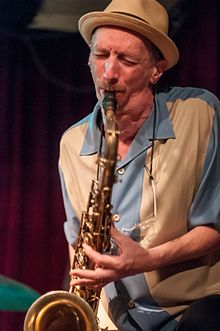Ellery Eskelin
| Ellery Eskelin | |
|---|---|

Eskelin at the Cornelia Street Cafe in Greenwich Village, New York City, 2012
|
|
| Background information | |
| Born |
August 16, 1959 Wichita, Kansas, U.S. |
| Genres | Jazz |
| Occupation(s) | Musician |
| Instruments | Saxophone |
| Website | www |
Ellery Eskelin (born August 16, 1959) is an American tenor saxophonist, born in Wichita, Kansas, and raised in Baltimore, Maryland, from the age of two. His parents, Rodd Keith and Bobbie Lee, were both professional musicians. Rodd Keith died in 1974 in Los Angeles, California, and became a cult figure after his death in the little-known field of "song-poem" music. Organist Bobbie Lee performed in local nightclubs in Baltimore in the early 1960s and provided Eskelin an introduction to standards from the Great American Songbook as well as inspiring an early interest in jazz music.
Eskelin has resided in New York City since 1983 and has led numerous international touring ensembles while participating as a sideman or collaborator with many of today's most forward-thinking composers and improvisers. He has released more than twenty-five recordings as a leader since the late 1980s, primarily for the Swiss hatOLOGY label. His most important work continues to be with the group he formed in 1994 featuring keyboardist Andrea Parkins and drummer Jim Black although he has maintained lasting musical associations with Joey Baron, Mark Helias, Gerry Hemingway, Marc Ribot, David Liebman, Han Bennink, Sylvie Courvoisier, Bobby Previte and Daniel Humair among others.
Eskelin's style has its roots in the jazz realm yet his unique phrasing (which is compared to Arnold Schoenberg's technique of "klangfarbenmelodie" in The Wire, December 1996) and the unorthodox techniques utilized in his compositions (in which composed and improvised elements often collide unpredictably) make for a music that defies easy categorization. Over the years, Eskelin has garnered significant critical praise in the international jazz press. 'Down Beat magazine has recognized him as "a major player in today's creative music" (September 1995) and described his compositional approach as "a startlingly new concept" (January 1997).
...
Wikipedia
